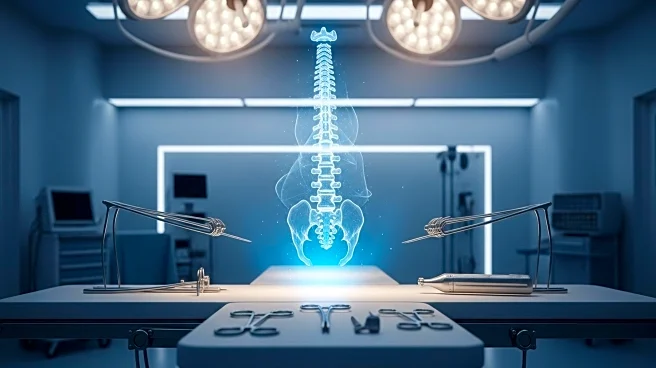What is the story about?
What's Happening?
Surgical Theater has announced FDA 510(k) clearance for its SyncAR Spine platform, a next-generation surgical XR tool for spine surgery. This platform integrates patient MRI and CT data into the operating room, aligning preoperative plans with intraoperative execution. SyncAR Spine utilizes AI-driven vertebra segmentation and advanced decompression planning to enhance surgical precision. It allows real-time tracking of bone removal and brings MRI data into minimally invasive procedures, offering clarity previously limited to open surgeries. The platform is integrated with Medtronic StealthStation navigation, providing surgeons with detailed insights and improved workflow alignment.
Why It's Important?
The FDA clearance of SyncAR Spine marks a significant advancement in surgical technology, potentially transforming spine surgery practices. By enhancing visualization and precision, this platform could improve surgical outcomes and patient safety. The integration of AI and XR tools may set new standards for intraoperative guidance, influencing future developments in surgical technology. Hospitals and surgical centers may adopt this platform to stay competitive and offer cutting-edge procedures, impacting healthcare costs and accessibility.
What's Next?
Surgical Theater plans to showcase SyncAR Spine at upcoming medical conferences, allowing spine surgeons to experience its capabilities firsthand. The platform's adoption may lead to further innovations in surgical XR technology, encouraging other companies to develop similar tools. As more surgeons utilize SyncAR Spine, data on its effectiveness and impact on surgical outcomes will become available, potentially influencing medical training and practices.
Beyond the Headlines
The integration of AI and XR in surgery raises ethical and legal considerations regarding data privacy and the role of technology in medical decision-making. As these tools become more prevalent, discussions on the balance between human expertise and technological assistance may emerge. Additionally, the long-term impact on surgical education and the skills required for future surgeons could be significant, as technology continues to evolve.















